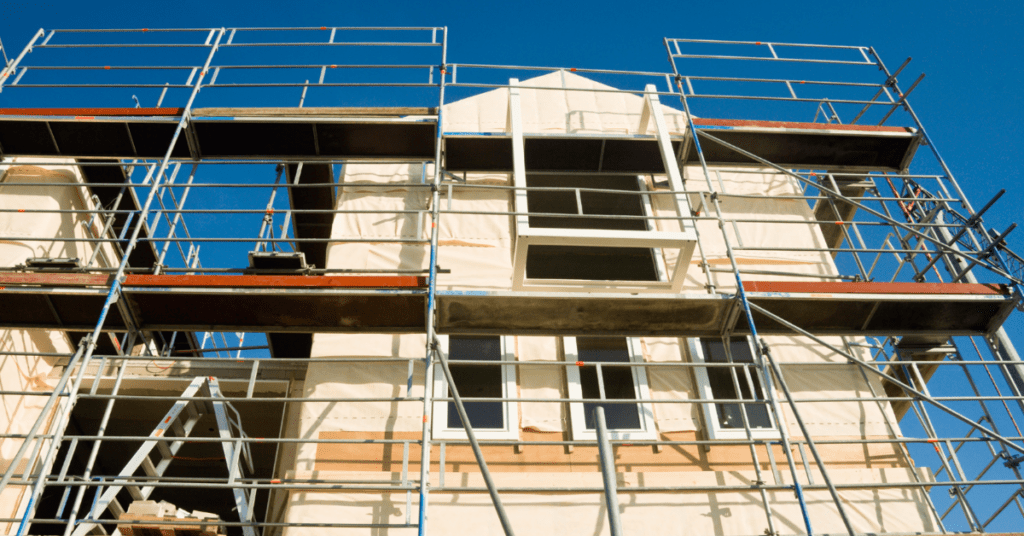What Does Scaffolding Insurance Cover That Standard Policies Don’t?

Just like a safety net catches a falling acrobat, scaffolding insurance covers vital gaps that standard policies often miss. You might assume general liability insurance has you covered, but it usually doesn’t address the specialised risks associated with scaffolding operations. From damage caused by unpredictable weather to theft and vandalism of equipment, scaffolding insurance steps in where others fall short. It even covers employee injuries on-site and legal expenses related to regulatory compliance. Curious about how these coverages can protect your business from unexpected setbacks? Let’s explore how scaffolding insurance provides that extra layer of security.
Key Takeaways
– Scaffolding insurance provides targeted protection against equipment theft and vandalism, often excluded from standard policies.
– It offers specialised risk assessments and safety protocol enhancements specific to scaffolding operations.
– Scaffolding insurance covers financial losses due to project delays, including penalties and extended rental costs.
– It includes comprehensive liability coverage for third-party injuries related to scaffolding incidents.
– Provides legal expenses coverage for disputes and regulatory compliance support tailored to scaffolding projects.
Physical Damage Coverage
Physical damage coverage is vital for protecting your scaffolding equipment from a wide range of potential hazards. When you’re working on a construction site, safety should always be your top priority. Scaffolding is susceptible to various risks, including accidental collisions, severe weather conditions, and even vandalism. This coverage guarantees that any physical damage to your scaffolding is promptly addressed, reducing downtime and maintaining project timelines.
To maximise the benefits of physical damage coverage, you need to implement rigorous scaffolding maintenance protocols. Regular inspections are important for identifying wear and tear or any structural weaknesses. By catching these issues early, you can prevent minor damages from escalating into significant problems that could disrupt your work and compromise safety.
Additionally, consider the materials used in your scaffolding. High-quality materials may have a higher upfront cost, but they offer better durability and reduce the likelihood of damage.
Physical damage coverage complements this investment by covering repair or replacement costs, making it a cost-effective strategy for long-term construction site safety.
Employee Injury Protection
Guaranteeing employee injury protection is paramount in maintaining a safe and efficient construction site. Scaffolding insurance goes beyond standard policies by providing specialised coverage tailored to the unique risks of working at heights.
It’s designed to enhance worker safety and streamline the claims process, minimising downtime and financial strain on your business.
Key aspects of employee injury protection include:
– Immediate medical expense coverage: Guarantees injured workers get the care they need without delay.
– Wage replacement benefits: Compensates employees who can’t work due to injury, helping them sustain their livelihood.
– Rehabilitation services: Provides access to physical therapy and other treatments, aiding in quicker recovery and return to work.
– Legal defence costs: Covers expenses related to defending against injury claims, protecting your business from financial loss.
– Accident investigation services: Offers expert analysis to prevent future incidents and improve overall site safety.
Equipment Theft and Vandalism
In the domain of construction, safeguarding against equipment theft and vandalism is essential for maintaining project timelines and financial stability. When you’re managing a construction site, the loss or damage of essential scaffolding equipment can lead to significant delays and unexpected expenses.
Standard insurance policies often fall short in covering these specific risks, making scaffolding insurance indispensable.
Scaffolding insurance provides thorough protection against theft and vandalism, guaranteeing that your investment in equipment is secure. It covers the cost of replacement or repair, minimising downtime.
Implementing robust equipment security measures, such as surveillance cameras, secure storage facilities, and access control systems, can further enhance your site’s defence against theft and vandalism.
Moreover, scaffolding insurance complements your theft prevention strategies by filling in the gaps left by standard policies. For instance, while standard policies may cover theft under certain conditions, they often exclude vandalism or may not fully compensate for the loss.
Scaffolding insurance guarantees that you’re not left bearing the brunt of these financial burdens. With this specialised coverage, you can focus on completing your projects efficiently, knowing your equipment is protected against unforeseen criminal activities.
Liability for Third-Party Injuries
When managing a construction site, your responsibility for third-party injuries can’t be overstated. Scaffolding accidents can result in severe injuries to bystanders, visitors, or even nearby workers.
Standard insurance policies often fall short in covering these third party claims, leaving you exposed to significant financial and legal risks. Scaffolding insurance, however, steps in to bridge this gap, providing robust coverage specifically designed for such scenarios.
Consider the emotional and financial toll of:
– Severe bodily injuries: From broken bones to life-threatening conditions.
– Legal fees: Mounting expenses from defending against lawsuits.
– Medical costs: Sky-high bills for emergency care and ongoing treatment.
– Rehabilitation expenses: Long-term recovery and physical therapy costs.
– Lost income: Compensation for the injured party’s inability to work.
These incidents can quickly escalate beyond the liability limits of a standard policy.
With scaffolding insurance, you gain higher liability limits tailored to the unique risks of construction sites. This specialised coverage guarantees you’re not only compliant with legal requirements but also protected against the devastating impact of third party claims.
Financial Loss From Delays
Besides the considerable risks of third-party injuries, managing a construction site also entails mitigating the financial repercussions of project delays. When delays occur, they can disrupt project scheduling and lead to significant financial losses.
Standard insurance policies often don’t cover the indirect costs that come from these interruptions, but scaffolding insurance can provide the necessary protection.
With scaffolding insurance, you’re not just safeguarding your physical assets; you’re also guaranteeing your project stays on track financially. This type of insurance covers expenses incurred due to unforeseen delays, such as extended equipment rentals and labour costs.
When your construction contracts stipulate strict deadlines, any delay can result in hefty penalties and lost revenue. Scaffolding insurance helps absorb these financial hits, allowing you to focus on completing the project efficiently.
Moreover, scaffolding insurance can cover additional costs like expedited shipping for delayed materials, or even alternative solutions to keep the project moving.
Legal Expenses Coverage
Legal challenges can arise unexpectedly on any construction project, making legal expenses coverage a critical component of your scaffolding insurance policy. When legal disputes occur, you need a policy that goes beyond standard exclusions to protect your financial stability.
Legal expenses coverage guarantees you’re not left shouldering the cost of legal representation, court fees, and other associated expenses. This coverage is particularly valuable given the complexity and high stakes of legal disputes in the construction industry.
Whether it’s a contractual disagreement or a liability claim, the right scaffolding insurance policy will cover these costs, saving you from potentially crippling expenses.
Here’s why you should prioritise legal expenses coverage:
– Unexpected Legal Fees: Cover the high cost of hiring legal experts.
– Court Costs: Confirm you’re not out-of-pocket for substantial court fees.
– Dispute Resolution: Access to specialised legal support to resolve disputes swiftly.
– Protection from Policy Exclusions: Avoid hidden exclusions that standard policies might include.
– Financial Security: Maintain financial stability even amid prolonged legal battles.
Incorporating legal expenses coverage into your scaffolding insurance policy guarantees that you’re covered thoroughly, safeguarding your assets and allowing you to focus on the successful completion of your projects.
Specialised Risk Assessment
Conducting a specialised risk assessment for your scaffolding operations is essential to identify and mitigate potential hazards unique to your project. Unlike standard policies, scaffolding insurance often requires a detailed risk evaluation to guarantee construction safety. This tailored approach helps you recognize specific risks associated with elevated work environments, such as structural instability, weather-related hazards, and potential falls.
During the risk evaluation process, you’ll analyse the scaffolding design, materials used, and the surrounding environment. This includes inspecting load capacities, anchorage points, and the integrity of the scaffold structure.
You’ll also assess external factors like wind speeds, ground conditions, and proximity to power lines. Identifying these risks early enables you to implement safety measures, such as reinforcing structures, using fall protection systems, and providing adequate training for your crew.
Moreover, a specialised risk assessment guarantees compliance with local regulations and industry standards, minimising legal liabilities. By addressing these unique hazards, scaffolding insurance can offer more extensive coverage, protecting your project from unforeseen incidents.
This proactive approach not only enhances construction safety but also guarantees your operations run smoothly and efficiently.
Frequently Asked Questions
What Is the Cost Difference Between Scaffolding Insurance and Standard Policies?
When comparing costs, you’ll find scaffolding insurance generally more expensive due to specific risk coverage. A thorough cost comparison reveals that policy exclusions in standard policies often necessitate scaffolding insurance for extensive protection, justifying the higher expense.
How Does Scaffolding Insurance Handle Coverage for Rented Equipment?
Imagine borrowing a friend’s car; you’d want insurance to cover any mishaps. Similarly, scaffolding insurance guarantees rented equipment is protected, providing specific liability coverage for potential damages or accidents, unlike standard policies that often exclude such scenarios.
Are There Any Industry-Specific Certifications Required for Scaffolding Insurance?
Yes, you’ll need to meet specific certification requirements for scaffolding insurance, adhering to industry standards. These certifications guarantee that your operations comply with safety regulations and help you qualify for the appropriate insurance coverage.
Can Scaffolding Insurance Be Customised for Different Project Sizes?
Yes, you can customise scaffolding insurance based on project scalability. Insurers perform a detailed risk assessment to tailor coverage, ensuring it meets the specific needs of different project sizes, from small sites to large-scale operations.
Does Scaffolding Insurance Cover Training for Safe Equipment Use?
Yes, scaffolding insurance often covers training programs for safe equipment use. It guarantees your team follows essential safety measures, reducing risks and potential accidents on-site. This coverage helps maintain compliance with industry safety standards.
Conclusion
In summary, scaffolding insurance is your safety net, covering risks standard policies leave dangling. From physical damage and theft to employee injuries and project delays, it fills the gaps to guarantee you’re fully protected. Think of it as a suit of armour for your construction operations, shielding you from legal headaches and financial pitfalls. Don’t let standard coverage leave you exposed; scaffolding insurance is tailored to keep your projects standing tall.



